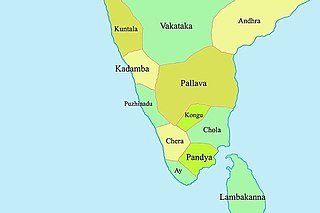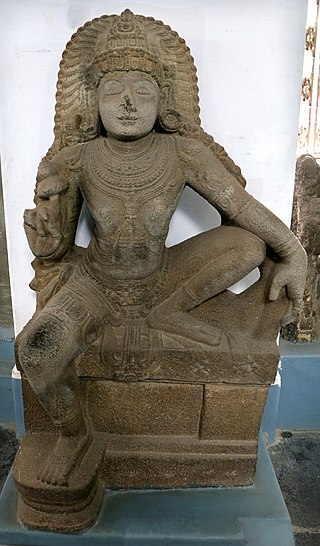Related Research Articles

The University of Toronto Scarborough, also known as U of T Scarborough or UTSC, is one of the three campuses that make up the tri-campus system of the University of Toronto. Located in the Scarborough district, Toronto, Ontario, Canada, the campus is set upon suburban parkland next to Highland Creek. It was established in 1964 as Scarborough College, a constituent college of the Faculty of Arts and Science. The college expanded following its designation as an autonomic division of the university in 1972 and gradually became an independent institution. It ranks last in area and enrolment size among the three University of Toronto campuses, the other two being the St. George campus in Downtown Toronto and the University of Toronto Mississauga.

Tamil Jains are ethnic-Tamils from the Indian state of Tamil Nadu, who practice Jainism, chiefly the Digambara school. The Tamil Jain is a microcommunity of around 85,000, including both Tamil Jains and north Indian Jains settled in Tamil Nadu. They are predominantly scattered in northern Tamil Nadu, largely in the districts of Tiruvannamalai, Kanchipuram, Vellore, Villupuram, Ranipet and Kallakurichi. Early Tamil-Brahmi inscriptions in Tamil Nadu date to the third century BCE and describe the livelihoods of Tamil Jains. Samaṇar wrote much Tamil literature, including the important Sangam literature, such as the Nālaṭiyār, the Silappatikaram, the Valayapathi and the Seevaka Sinthamaṇi. Three of the five great epics of Tamil literature are attributed to Jains.
Kambar or Kavichakravarthy Kamban was an Indian Tamil poet and the author of the Ramavataram, popularly known as Kambaramayanam, the Tamil version of the epic Ramayana. Kambar also authored other literary works in Tamil, such as Thirukkai Vazhakkam, Erezhupathu, Silaiyezhupathu, Kangai Puranam, Sadagopar Anthathi and Saraswati Anthathi.

Cilappatikāram, also referred to as Silappathikaram or Silappatikaram, is the earliest Tamil epic. It is a poem of 5,730 lines in almost entirely akaval (aciriyam) meter. The epic is a tragic love story of an ordinary couple, Kannaki and her husband Kovalan. The Cilappathikaram has more ancient roots in the Tamil bardic tradition, as Kannaki and other characters of the story are mentioned or alluded to in the Sangam literature such as in the Naṟṟiṇai and later texts such as the Kovalam Katai. It is attributed to a prince-turned-monk Iḷaṅkõ Aṭikaḷ, and was probably composed in the 5th or 6th century CE.

The Pandyan dynasty, also referred to as the Pandyas of Madurai, was an ancient Tamil dynasty of South India, and among the three great kingdoms of Tamilakam, the other two being the Cholas and the Cheras. Existing since at least the 4th to 3rd centuries BCE, the dynasty passed through two periods of imperial dominance, the 6th to 10th centuries CE, and under the 'Later Pandyas'. The Pandyas ruled extensive territories, at times including regions of present-day South India and northern Sri Lanka through vassal states subject to Madurai.

Jatavarman Sundara I, also known as Sadayavarman Sundara Pandyan, was a emperor of the Pandyan dynasty who ruled regions of Tamilakkam between 1250–1268 CE. He is remembered for his patronage of the arts and tamil architecture, along with refurbishment and decoration of many Kovils (temple) in the Tamil continent. He oversaw a massive economic growth of the Pandyan empire. On the eve of his death in 1268 CE, the second Pandyan empire's power and territorial extent had risen to its zenith.

Kongu Nadu, also known by various names such as Kongu Mandalam and Kongu belt, is a geographical region comprising present day parts of western Tamil Nadu, southeastern Karnataka and eastern Kerala. In the ancient Tamilakam, it was the seat of the Chera kings, bounded on the east by Tondai Nadu, on the south-east by Chola Nadu and on the south by Pandya Nadu regions.

The Chera dynasty, IPA: [t͡ʃeːɾɐ], was a Sangam age dynasty who are credited as the Creators of land of Kerala as they have unified various regions of the western coast and western ghats to form the early Chera empire.
Vellalar is a group of castes in the Indian states of Tamil Nadu, Kerala and northeastern parts of Sri Lanka. The Vellalar are members of several endogamous castes such as the numerically strong Arunattu Vellalar, Chozhia Vellalar, Karkarthar Vellalar, Kongu Vellalar, Thuluva Vellalar and Sri Lankan Vellalar.
Kongu Vellalar is a community found in the Kongu region of Tamil Nadu, India.

Ayyanar is a Hindu deity venerated in South India and Sri Lanka. His worship is prevalent among the Dravidian peoples. Some studies suggest that Ayyanar may have also been worshipped in Southeast Asian countries in the past. He is primarily worshipped as one of the guardian folk deities of Tamil Nadu. The temples of Ayyanar in the countryside are usually flanked by gigantic and colourful statues of him and his companions riding horses or elephants.

Tamil Brahmins are an ethnoreligious community of Tamil-speaking Hindu Brahmins, predominantly living in Tamil Nadu, though they number significantly in Telangana, Andhra Pradesh, Kerala, Karnataka, in addition to other regions of India, as well as Sri Lanka. They can be broadly divided into two denominations: Iyengars, who are adherents of Sri Vaishnavism, and Iyers, who follow the Srauta and Smarta traditions.
Sengunthar, also known as the Kaikolar and Senguntha Mudaliyar is a Tamil caste commonly found in the Indian state of Tamil Nadu and also in some other parts of South India and the neighboring country Sri Lanka. They were traditional weavers by occupation and warriors by ancient heritage. They were part of the Chola army. Majority of Sengunthars are sub-divided into numerous clans based on a patrilineal lineage known as Koottam or Gotra.
Tamil Nadu has a rich history of art and entertainment. The three modes of entertainment classified as Iyel (Literature), Isai (Music) and Nadagam (Drama) had their roots in the rural folk theatre like Theru Koothu. Many forms of group and individual dances with the classical forms for popularity and sheer entertainment value. Some of the dance forms are performed by Tribal people. The majority of these dances are still thriving in Tamil Nadu today.

Nainativu, is a small but notable island off the coast of Jaffna Peninsula in the Northern Province, Sri Lanka. The name of the island alludes to the folklore inhabitants, the Naga people. It is home to the Hindu shrine of Nagapooshani Amman Temple; one of the prominent 64 Shakti Peethas, and the Buddhist shrine Nagadeepa Purana Viharaya.

Tamil Canadians, or Canadian Tamils, are Canadians of Tamil ethno-linguistic origin. Much of Canada's Tamil diaspora from India and Sri Lanka then majority consist of Sri Lankan Tamil refugees who sought to flee the ethnic tensions during the Sri Lankan Civil War between the 1970s and 2000s, while economic Tamil migrants also originate from India, Singapore and other parts of South Asia.
Ponnar Shankar is a historical story as part of the post-Sangam history of the Tamil country. This period saw the rise and fall of many kingdoms, some of which were empires that exerted influence far and wide.
Thiripurasundari Srinivasan, better known by her pen name Lakshmi, was an Indian writer from Tamil Nadu.

Ponnar Shankar is a 2011 Indian epic historical drama film produced and directed by Thiagarajan. It is a fictionalised account of the Ponnar Shankar epic, adapted from M. Karunanidhi's novel of the same name. It features Thiagarajan's son Prashanth in lead dual roles as warrior princes, portraying the title characters, with actresses Pooja Chopra and Divya Parameshwaran making their film debut as princesses and Prakash Raj as the main antagonist. The film also features an extensive cast of supporting actors with Prabhu, Jayaram, Khushbu Sundar, Sneha, Vijayakumar, Nassar, Rajkiran, Napoleon, and Ponvannan, amongst others. The background score and soundtrack of the film, composed by Ilaiyaraaja, with cinematography handled by Shaji Kumar and editing done by Don Max.
Gabriella Eichinger Ferro-Luzzi is an Italian anthropologist and dravidologist who has done field studies in India, mainly in the Tamil Nadu state.
References
- 1 2 3 4 Rao, Subha J. (February 6, 2015). "When Brenda became Brindha". The Hindu. COIMBATORE. Retrieved Sep 12, 2016.
- ↑ Beck, Brenda E. F. (1968). Social and conceptual order in Koṅku (Thesis). University of Oxford.
- ↑ "Status Only Appointments, Anthropology". University of Toronto. Retrieved Sep 16, 2016.
- ↑ Nainar, Nahla (2018-07-20). "A story with an everlasting appeal". The Hindu. ISSN 0971-751X . Retrieved 2020-06-08.
- 1 2 3 4 5 "U of T Anthropologist donates gift to Tamil Studies at U of T Scarborough". University of Toronto Scarborough - News and Events. Retrieved 2020-06-08.
- ↑ "About Us – Legend Of Ponnivala" . Retrieved 2020-06-08.
- ↑ Swaroop, Vishnu (July 9, 2018). "Kongu epic now Tamil lesson for kids in Canada". The Times of India. Retrieved 2020-06-08.
- ↑ "Kongu Association of DC held a wonderful Family Reunion in Manassas, Virginia On September 1st and 2nd, 2018 – Legend Of Ponnivala" . Retrieved 2020-06-08.
- ↑ "The Sophia Hilton Foundation of Canada – The Sophia Hilton Foundation of Canada" . Retrieved 2020-06-08.
- ↑ "The Sophia Hilton Foundation of Canada" . Retrieved 2020-06-08.
- ↑ "'Something that should be shared internationally': How an ancient Tamil epic was given new life at U of T Scarborough". University of Toronto News. Retrieved 2020-06-08.
- B. Meenakshi Sundaram, A Canadian with a Fragrance of Rural Kongu, New Indian Express